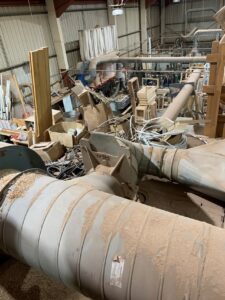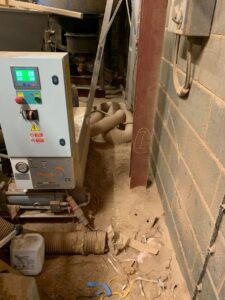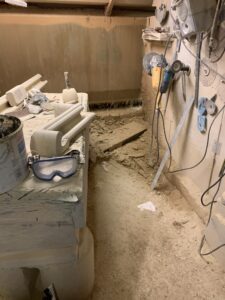Manufacturing firm fined after workers struck by stone slabs
A manufacturing firm in Ipswich has been fined after two workers were struck by slabs of stone, with one of the men sustaining multiple bone fractures as a result.
Three slabs of quartz stone fell from a stillage onto Steven Constable and Struan Dunsmore while they worked at Bespoke Stone Ltd’s workshop on Dales Road.
The pair, both from Ipswich, had been preparing to lift one of the slabs onto a saw bed when all three fell onto them on 17 June 2022.
After sustaining multiple bone fractures and soft tissue damage, Mr Constable has required a number of operations and has been unable to work for over two years. The 54-year-old sustained fractures to his right femur, hip, left tibia and foot. He has spent a total of 12 weeks in hospital.
Mr Dunsmore, 31, sustained bruising to his body and required time off from work following the incident.
A Health and Safety Executive (HSE) investigation found Bespoke Stone Ltd’s handling and storage of slabs was unsafe in that the material was not secure. The restraint system provided did not fit around larger sizes of material. The company also failed to accurately report the injuries sustained by Mr Constable and the time taken off work by Mr Dunsmore under RIDDOR regulations.
HSE guidance states slabs should always remain restrained during loading/unloading operations, whether from vehicles or from storage when any person could be in the hazard zone into which a slab might fall from its racked position or fail during lifting. Further guidance can be found at: Handling and storage of large sheet stone slabs – HSE
Bespoke Stone Ltd, of Dales Road, Ipswich, pleaded guilty to breaching Section 2(1) of the Health and Safety at Work etc. Act 1974. The company was fined £6,600 and ordered to pay £4,875.40 in costs at Peterborough Magistrates’ Court on 17 January 2025.
HSE inspector Jessica Flint said: “Bespoke Stone Ltd failed to grasp the importance of safe handling and storage of stone materials in stone masonry, with employees regularly working within the hazard zone of slabs during operations within its workshop.
“The CCTV footage makes clear how serious this incident was, with one of the employees sustaining a number of horrific injuries which have affected his ability to return to work. Companies should be aware that HSE will not hesitate to take appropriate enforcement action against those that fall below the required standards.”
This prosecution was brought by HSE enforcement lawyer Matthew Reynolds and supported by HSE paralegal officer Melissa Wardle.
Further information:
- The Health and Safety Executive (HSE) is Britain’s national regulator for workplace health and safety. We are dedicated to protecting people and places, and helping everyone lead safer and healthier lives.
- More information about the legislation referred to in this case is available.
- Further details on the latest HSE news releases is available.
- HSE does not pass sentences, set guidelines or collect any fines imposed. Relevant sentencing guidelines must be followed unless the court is satisfied that it would be contrary to the interests of justice to do so. The sentencing guidelines for health and safety offences in England and Wales can be found here and for those in Scotland here.
- CCTV footage can be found here: CCTV footage – HSE v Bespoke Stone Ltd.mp4 – Google Drive















